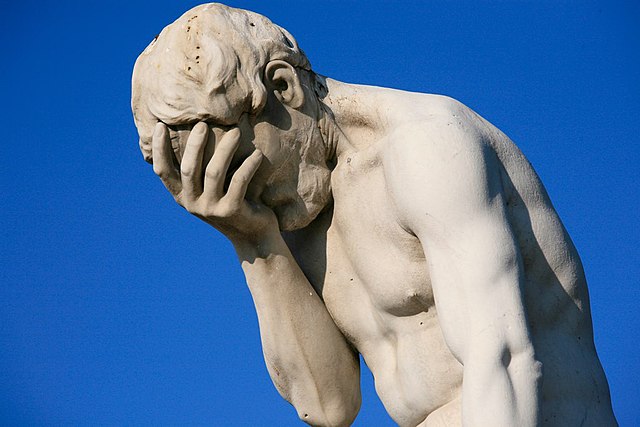 I’ve been having a couple of different conversations of late but two in particular seem to dovetail nicely. First, there was one with a theist who insisted that we had to take things like the laws of logic on blind faith and secondly, one going on over on my YouTube channel right now with a philosopher who seems very self-satisfied that philosophy is the end-all-be-all of human intellect.
I’ve been having a couple of different conversations of late but two in particular seem to dovetail nicely. First, there was one with a theist who insisted that we had to take things like the laws of logic on blind faith and secondly, one going on over on my YouTube channel right now with a philosopher who seems very self-satisfied that philosophy is the end-all-be-all of human intellect.
Come on people, it’s not difficult to figure out what’s actually going on!
So we’ll start off with the first. It’s hardly the first time that I’ve done this but nobody ever listens. He started to argue that atheists need faith, you know how that goes, and that things like the laws of logic are faith-based. I disagreed. Take the law of identity, which says, in effect, A=A. A thing is, by its very nature, itself. Now, I said, show me absolutely anything in the universe that isn’t true of. Go ahead. Or, take the law of non-contradiction. A thing cannot be itself in the same way and at the same time as it is being not-itself. Again, show me anything in the universe that violates that rule. Go ahead, I’ll wait.
 Of course, he couldn’t. The simple reality is, and this goes for philosophers, some of whom don’t seem to understand either, that we came up with these things through observation and then extending our understanding universally. We have never seen anything that can be itself and not itself at the same time, thus we assume, based on our experiences, that it doesn’t happen. Could it though? Certainly. Maybe at the very center of a black hole, there’s a magical happy land where things are themselves and not themselves as a matter of course. We don’t know. If we were to ever find that to be true, we’d have to modify our understanding of logic based on new observations. It always comes down to human understanding and that is always incomplete.
Of course, he couldn’t. The simple reality is, and this goes for philosophers, some of whom don’t seem to understand either, that we came up with these things through observation and then extending our understanding universally. We have never seen anything that can be itself and not itself at the same time, thus we assume, based on our experiences, that it doesn’t happen. Could it though? Certainly. Maybe at the very center of a black hole, there’s a magical happy land where things are themselves and not themselves as a matter of course. We don’t know. If we were to ever find that to be true, we’d have to modify our understanding of logic based on new observations. It always comes down to human understanding and that is always incomplete.
The second argument is one that, unfortunately, I have near constantly. Someone popped onto one of my videos on philosophy and started to argue that the concept of numbers is, in fact, “real”. Numbers “exist”. I’d addressed this in the video already. Numbers are something that mankind made up because it’s useful. It doesn’t exist in the real world. In fact, he brought up the fact that numbers were brain states, something I’d also previously addressed, and in that, I’ll agree. Numbers “exist” in the minds of people for whom that brain state is present.
 The problem is, nobody is ever willing to define what these terms mean. What do you mean by “exist”? If all you’re talking about is the fact that, for anyone who has the brain state that “one” is real, for that individual, that concept is subjectively real, sure. But that’s not saying anything useful. It’s like saying that because lots of little children believe in Santa Claus, that means there’s really a fat old man living at the North Pole.
The problem is, nobody is ever willing to define what these terms mean. What do you mean by “exist”? If all you’re talking about is the fact that, for anyone who has the brain state that “one” is real, for that individual, that concept is subjectively real, sure. But that’s not saying anything useful. It’s like saying that because lots of little children believe in Santa Claus, that means there’s really a fat old man living at the North Pole.
Reality doesn’t work like that.
The problem here is that, just because you have a concept in your head, represented by your brain chemistry, that doesn’t actually get you anywhere useful. George Lucas made up an evil Empire that flies around in a gigantic Death Star. That doesn’t mean it’s actually true in objective reality. For people who have seen Star Wars, they probably have an idea in their heads about what the Empire is and what the Death Star looks like, but that’s where it stops. That doesn’t translate to anything objectively real.

In factual truth, numbers can’t be universal. That they exist within the heads of most humans means nothing. Do they exist in the head of a newborn baby? Certainly not. Do they exist in a bacteria? No. It’s like talking about the Pirahã, who had no concept of a god before they were met by outsiders. A lot of people love to claim that everyone has an internal belief in God, whether they want to admit it or not. That’s demonstrably not true because the Pirahã didn’t.
What we’re left with is the learned concept of numbers that exist nowhere except in the minds of people who actually understand them. That’s subjective, not objective. In fact, the idea of “one” is even more so. People in other cultures who speak other languages, they don’t know what the hell “one” is. They’ve got their own label to put in the concept that is no more “real” than “one” is. You might be able to argue that there’s a single thing right there and that makes it “one”. Or does it make it “eins” in German, “uno” in Spanish, “odin” in Russian or “yksi” in Finnish? How you represent a concept doesn’t really matter. It remains nothing more than an electro-chemical reaction in that 3-pound sack of meat on your neck. If you want to call that “real”, knock yourself out. It doesn’t mean anything more than that though.
 It’s why having conversations with a lot of dedicated philosophers gets you absolutely nowhere. How do you know that? Well, they can’t explain. It’s just got to be true! You know who else does that? The religious. They act like, because it’s in their head, it’s got to be so and that’s just not defensible. My goal in having any of these discussions is to reach truth, or as close as we can reasonably get, given our limitations as human beings. The goals of these other people, seemingly at least, is to reach comfort. It’s to find a place where they can think well of themselves without really caring if any of it is actually true. This person is arguing, at the moment, that truth doesn’t matter because “truth” isn’t eternal.
It’s why having conversations with a lot of dedicated philosophers gets you absolutely nowhere. How do you know that? Well, they can’t explain. It’s just got to be true! You know who else does that? The religious. They act like, because it’s in their head, it’s got to be so and that’s just not defensible. My goal in having any of these discussions is to reach truth, or as close as we can reasonably get, given our limitations as human beings. The goals of these other people, seemingly at least, is to reach comfort. It’s to find a place where they can think well of themselves without really caring if any of it is actually true. This person is arguing, at the moment, that truth doesn’t matter because “truth” isn’t eternal.
These people all have a lot of problems, don’t they?